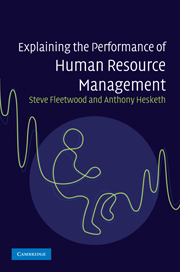Book contents
- Frontmatter
- Dedication
- Contents
- List of figures
- List of tables
- Preface
- Acknowledgements
- Part I HRM and organisational performance today
- Part II Meta-theorising the HRM–P link
- 3 The state of contemporary research on the HRM–P link
- 4 Scientism
- 5 Prediction, explanation and theory
- 6 Critical realism
- Part III Reflexive performance
- Notes
- Bibliography
- Index
5 - Prediction, explanation and theory
Published online by Cambridge University Press: 05 July 2014
- Frontmatter
- Dedication
- Contents
- List of figures
- List of tables
- Preface
- Acknowledgements
- Part I HRM and organisational performance today
- Part II Meta-theorising the HRM–P link
- 3 The state of contemporary research on the HRM–P link
- 4 Scientism
- 5 Prediction, explanation and theory
- 6 Critical realism
- Part III Reflexive performance
- Notes
- Bibliography
- Index
Summary
Introduction
This chapter will demonstrate that empirical research on the HRM–Performance link is characterised by: a preoccupation with prediction to the neglect of explanation; serious confusion surrounding, and between, the concepts of prediction and explanation; and a lack of clarity vis-à-vis the nature and purpose of theory. It will also demonstrate that these problems cannot be resolved by retaining scientistic meta-theory and ‘bolting on’, as it were, a theory or theories drawn from other disciplines.
The first part of the chapter considers prediction and the following contradiction. Whilst prediction is central to scientism’s (alleged) scientificity, scientism actually lacks predictive power and, therefore, fails to meet its own criteria for scientificity. This is not commonly recognised because of the ambiguity that surrounds the use of the term ‘prediction’. The second part considers explanation by considering what explanation is not (Chapter 6 will deal with what it is, or should be) and highlights serious confusion between the concepts of prediction and explanation. The third part of the chapter considers the possibility that under-theorisation of empirical research on the HRM–P link could be reduced by borrowing theories from other disciplines, especially psychology and economics. We will use the latter to show that raiding other disciplines for theories, especially for a paradigm that lacks sophisticated meta-theoretical insight, coupled with a limited understanding of the nature and purpose of theory, introduces more problems than it solves. The final part of the chapter takes us back to why empirical research on the HRM–P link is under-theorised in the first place. We show that from the scientistic perspective, a theory is merely a vehicle for delivering predictions and hypotheses in terms of regularities between events, so we should not be at all surprised when it fails to deliver explanation.
- Type
- Chapter
- Information
- Explaining the Performance of Human Resource Management , pp. 164 - 204Publisher: Cambridge University PressPrint publication year: 2010



